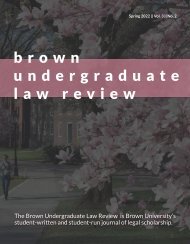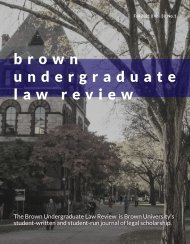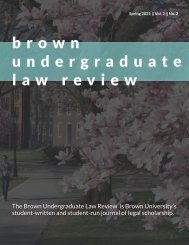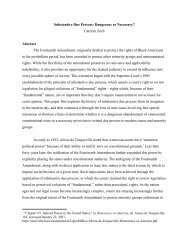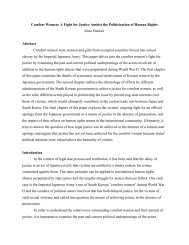Brown Undergraduate Law Review -- Vol. 2, No. 1 (Fall 2020)
We are proud to present the Brown Undergraduate Law Review's Fall 2020 issue. We hope you will all find our authors' works fascinating and thought-provoking.
We are proud to present the Brown Undergraduate Law Review's Fall 2020 issue. We hope you will all find our authors' works fascinating and thought-provoking.
You also want an ePaper? Increase the reach of your titles
YUMPU automatically turns print PDFs into web optimized ePapers that Google loves.
illegitimate origins of the constitution as the premise for its
replacement.
Chilean critiques of the constitution go deeper than its
symbolic baggage and moral illegitimacy, and include
more substantive reasons for needing a new constitution.
One such critique is that the 1980 constitutional text limits
the government?s ability to increase spending on welfare
and social programs. 26 Pinochet?s regime did not only
implement neoliberal economic policies during its time in
power, but also wrote into the constitution an emphasis on
property rights and constraints on state interference.
Article 19, for example, guarantees private property rights
and incorporates measures that deny the state?s ability to
infringe on those rights. 27 Article 67 requires Congress to
indicate the allocation and amount of a new expenditure,
and any expenditures that exceed projections require that
Congress ?proportionately reduce all expenditures,
regardless of their nature.? 28 This limits the ability of the
Chilean government to enact the kinds of social policies
sought by the many Chileans who are adversely affected
by an inequitable distribution of wealth and power. 29 This
is one way in which the 1980 constitution hinders the
Chilean government from meeting the demands of the
Chilean people and truly representing the kinds of policies
they seek.
A related problem is that the rules set out for a
constitutional amendment require very high quorums
within Congress to approve constitutional reforms, making
it difficult to achieve changes to the existing document.
Chile?s Constitutional Renewal: A Lesson to be Learned?
The force of the military dictatorship facilitated the
implementation of a status quo that could never have
otherwise been achieved, allowing for a ?polarizing
right-wing veto against democratic decision making? to
control the political system. 30 Owing to its permanent high
quorum provisions and supra-majoritarian mechanisms
ensuring the supremacy of the Chilean right wing, the
constitution denies ?the democratic process by which the
will of the people translates into law and public policy, the
basic feature of democracy.? 31
This puts the constitution at the root of many Chileans?
persisting dissatisfaction with institutions, politics, and
representatives. 32 Chile?s current crisis of representation
and the related public discontent with
difficult-to-dismantle neoliberal conventions are thus
closely linked to the constitution. While laws have
gradually progressed to reconcile social views and
legislation with regard to issues of social, ethnic, and
human rights, the 1980 constitution will perpetually deny
key components of a proper democratic process. 33
The Challenges of Constitutional Renewal
Constitutional replacement will not necessarily resolve the
legitimacy problem of the current document. New
constitutions lack the power of procedural precedent and
institutional norms, rendering younger constitutions
inherently less legitimate than older ones. 34 This creates
the paradoxical possibility that in replacing the 1980
constitution to address its problem of illegitimacy, a new
such problem is created. Venezuela, where 26
26. Bellolio, "Will the People.?
27. Andrew Berryhill, "Constitutional Restraints and Economic Stability: Explaining Chile's Economic Development since 1990," Collegiate
Scholars Program Thesis (CSP 401-402), 2019, 19.
28. Ibid., 13.
29. Bellolio, "Will the People.?
30. Heiss, 475.
31. Ibid., 471.
32. Ibid., 470.
33. Ibid., 471.
34. Ibid., 24.
Brown Undergraduate Law Review
32




